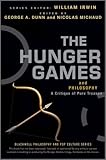 There may be spoilers within. Read on at your own risk.
There may be spoilers within. Read on at your own risk.
The Hunger Games trilogy certainly seems to have an anti-violence message within it. The Capitol forces children from each of its Districts to compete once a year in a battle to the death. The entire premise of the Hunger Games themselves is hated by all but the residents of the Capitol. Katniss, especially, despises the violence she sees, although this ultimately does not prevent her from committing her own acts of violence. Still, part of the intrigue in reading the series is rooting for the downfall of the society that forces this kind of gross violence on its own citizens.
The problem is that in order to get across this anti-violence idea, the story takes an exceptionally violent path. Isn’t there something a little strange about this?
On one view, Aristotle suggests in his Poetics that one benefit of tragedies (on stage, but we can elaborate to books or movies) is the process of catharsis. Arguing against Plato, who believed that fiction made one more hysterical, Aristotle ventured that viewing such tragedy can actually allow one to purge their emotions and thus have better control over them. And after all, we know it’s fiction, right?
On another view, modern science has been striving to show that exposure to violence in any form can have a negative effect on people, and especially children, in the form of desensitization and increased agressive tendency. If that turns out to be true, what then, is the effect of promoting an anti-violence message using violent imagery? Which message wins out?
The question that sits a bit uneasily with me is: why are we so entertained by reading about kids murdering each other?
I understand that it’s fiction. I also understand that the aim of the violence is to show the problems with violence. And yet, I can readily admit that it was the violence and threat of constant danger to Katniss and her loved ones that made this series as entertaining as it is. A bit of schadenfreude rears its ugly head. We like to think we’ve moved past the age of Roman gladiator battles, but how far away are some of sports and reality television shows from this same type of pleasure. How far away is Survivor from allowing it’s title to be more literal. How much pleasure do we take from boxing or MMA battles? Honestly, I’m left with more questions than answers when I think about conflict, as can often be the case when trying to look at issues a little more philosophically.
What do you think? Is the anti-violence message stronger than the violent imagery that it’s encapsulated in?
For further reading:



